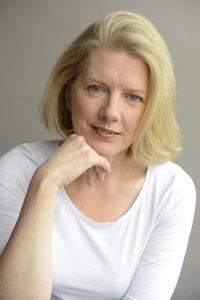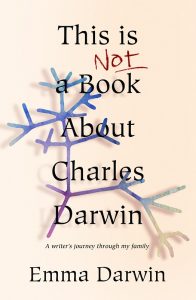This is Not a Book About Charles Darwin: a Writer’s Journey Through my Family
 The reviews are just beginning to come in. One calls This is Not a Book About Charles Darwin “charming”, another “witty and eloquent”, but a third praises its “naked courage and fiercely intelligent understanding”. I’m thrilled, but they don’t sound like the same book, do they?
The reviews are just beginning to come in. One calls This is Not a Book About Charles Darwin “charming”, another “witty and eloquent”, but a third praises its “naked courage and fiercely intelligent understanding”. I’m thrilled, but they don’t sound like the same book, do they?
The thing is, right from the start, This is Not a Book About Charles Darwin was woven together from very different parts of my writing self. Of course, most writers find that one book leads to another, either because something wonderful doesn’t fit in the current project, or out of reaction, because only something quite different will fire new writing energy. But This is Not a Book, which is published on Darwin Day, 12th February, came about through a more complicated set of actions and reactions.
After the success of my debut The Mathematics of Love, and its successor, A Secret Alchemy, I wrote a third novel, which my very patient agent and I eventually agreed didn’t work and wouldn’t sell. So what now? My agent would have been negligent not to say what she did: that my great-great-grandparents, being Charles Darwin and his wife Emma, née Wedgwood, had proved more interesting to many journalists than “Writer you haven’t heard of writes novel you haven’t heard of”, so how about writing a novel about someone in the famous side of my family?
I did know something about them: not only The Ancestor, but his grandfather the polymath Erasmus Darwin; Tom Wedgwood, the first photographer; Julia Wedgwood, who as a writer and intellectual was ranked with George Eliot; composer Ralph Vaughan Williams and his extraordinary love story; and poet and Communist John Cornford, first Briton to be killed in the Spanish Civil War. But I was very reluctant, half because of a paralysing terror of “showing off”, and half because I’d found it incredibly difficult to write the real historical characters in A Secret Alchemy, which is about the mother and the uncle of the Princes in the Tower.
But I teach writing and blog at This Itch of Writing, and I’m endlessly fascinated by the creative process; I’d even given talks on how it shows up in my forebears. After much scrambling around in the family tree I began a novel about my grandparent’s generation: not only RVW but artist Gwen Raverat, poet Frances Cornford, geneticist Nora Barlow, and my physicist grandfather Charles, who worked on the Manhattan Project.
It took me three years of hard writing – and a serious brush with mortality, directly caused by the stress of the disaster I’d landed myself in – before I finally acknoweldged that I could not do it.
I’d been bred up with the scholar’s, historian’s, scientist’s, and lawyer’s rules: the existence of truth, the primacy of facts and evidence, the obligation to make an argument from reason and logic not emotion or rhetoric, the absolute necessity of proving your case through reason, and above all the obligation to give way on any subject, if someone else has greater knowledge and authority in it. By contrast, fiction is my private space: in the story I’m writing, I am sole empress of my kingdom, my imagination’s only limits are those I choose to set, and the only authority is my own creative judgement.
In A Secret Alchemy at least the insides of my “real” characters’ heads were a blank for historians, and so were mine to write on, but for my family there were no such blanks: these real people had already written about themselves and each other, in thousands of letters and memoirs stacked in archives and library shelves. It was only when I was better, and understood that the “family culture” that had underpinned so many of my forebears’ creative work was exactly what was scuppering mine, that I was finally able to let go, and abandon the novel.
But, I found, I still wanted to write about my family – and I still needed to sell a book. A biography? But everyone who merited a “proper” biography had at least one written about them already, and I didn’t see a future making use of the scholarly skills I’d so laboriously have to learn. I certainly didn’t want to write a memoir of myself: even I’m not interested in my self except when it gets in the way of my writing, and I’ve no great taste for soothingly or searingly redemptive sagas of illness and adversity overcome.
It was Helen Macdonald’s H is for Hawk, oddly, which presented an answer, though it couldn’t be more different from This is Not a Book. She writes astonishingly closely, evocatively and vividly about a particular section of her life – her hawk, her grief for her father, and T H White’s classic Goshawk – but without cluttering the story up with the quotidian stuff of autobiography.
Could I write about my family by leaving out everything of myself, and of the family, except what mattered to the story of my trying and failing to write the novel? I went to Edmund de Waal’s The Hare with Amber Eyes, for ways to weave together the writer’s own story with that of others; I went to Geoff Dyer’s Out of Sheer Rage for ways to write about failing to write a book.
The first draft came in six weeks, and the title, This is Not a Book About Charles Darwin, arrived as precipitately, because he is the one family person I never once considered writing a novel about – and yet if he hadn’t existed, none of any of this would have happened. And if you’re thinking that it’s also a mighty handy title for anyone anxious to come high up in the search engine algorithms, that rather proves the point: that nothing I can do, as a writer, will ever outweigh what was written by my great-great-grandfather.
—
Emma was born in London and grew up there, with interludes in Manhattan and Brussels. After studying Drama & Theatre Arts at the University of Birmingham she had various jobs, including driving a sandwich van and selling musical instruments, before her first novel The Mathematics of Love (Headline Review/William Morrow) was published. It was described by The Times it as ‘that rare thing, a book that works on every conceivable level. A real achievement’, and it was shortlisted for the Commonwealth Writers and Goss First Novel prizes, longlisted for the Prince Maurice Prize and the Romantic Novelists Association Novel of the Year, and has been translated into many languages. Her Sunday Times bestselling second novel, A Secret Alchemy (Headline Review/Harper Perennial), was acclaimed by the Daily Mail as ‘powerful and utterly convincing’ and by The Times as one of the fifty best paperbacks of the year. Her short fiction has won prizes and been broadcast on BBC Radio 4.
Emma was the first writer to graduate from Goldsmiths with a PhD in Creative Writing, and she teaches and mentors writers: her most recent book is Get Started in Writing Historical Fiction, (John Murray Learning/Teach Yourself). She has held Royal Literary Fund Fellowships at Goldsmiths and the Royal College of Music, and her blog, This Itch of Writing, is used by writers, editors and teachers around the world.
She is the great-great grand-daughter of Charles Darwin and his wife Emma Wedgwood, and she still lives in London.
Website: www.emmadarwin.com
Blog: emmadarwin.typepad.com/thisitchofwriting
Twitter: @emma_darwin
Facebook: https://www.facebook.com/Emma-Darwin-308193202543535/
THIS IS NOT A BOOK ABOUT CHARLES DARWIN
 Everybody knows about Charles Darwin, and many know about others in his family, from Erasmus Darwin and Tom Wedgwood, the first photographer, to composer Ralph Vaughan Williams and poet and radical John Cornford, the first Briton to be killed in the Spanish Civil War. But when Charles and Emma Darwin’s great-great-granddaughter, another Emma Darwin, tried to root her new novel in that history, the conflict between her complex heritage, and her own identity as a writer, became a battle that nearly killed her.
Everybody knows about Charles Darwin, and many know about others in his family, from Erasmus Darwin and Tom Wedgwood, the first photographer, to composer Ralph Vaughan Williams and poet and radical John Cornford, the first Briton to be killed in the Spanish Civil War. But when Charles and Emma Darwin’s great-great-granddaughter, another Emma Darwin, tried to root her new novel in that history, the conflict between her complex heritage, and her own identity as a writer, became a battle that nearly killed her.
This is Not a Book About Charles Darwin takes the reader on a writer’s journey through the Darwin-Wedgwood-Galton clan, as seen through the lens of Emma’s struggle. Along the way, her wry, witty and honest memoir becomes a brave book about failure – and, above all, a book about writing and how stories are told. Richly illustrated with over 40 black and white images.
BUY THE BOOK HERE
Category: Contemporary Women Writers, On Writing

























